Actions, Awards, Events
2024 has been a year of change, and of progress. It gave us ample opportunity for actions and new ventures.
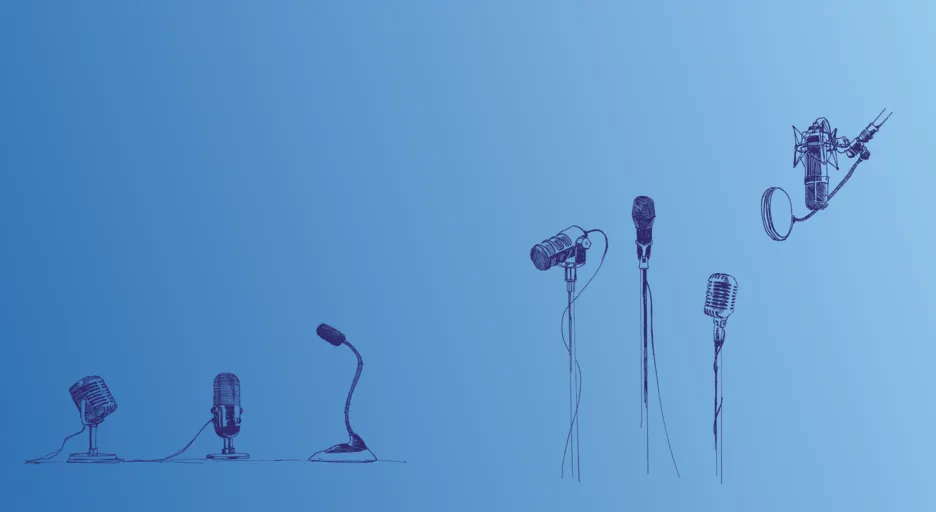
Actions
Pioneering research and sustainability stand at the core of TUM-IAS. In 2024, we successfully implemented activities that we had initiated for the first time or drove programs forward, while also starting new initiatives.
Dieter Schwarz Courageous Research Grant
The Dieter Schwarz Courageous Research Grant is funded by the Dieter Schwarz Foundation to promote bold and visionary project ideas. This new Fellowship is open to outstanding international scientists from outside TUM who, together with a TUM research group, intend to use groundbreaking technology to propose a radical solution to a major challenge in “Digitization and Sustainability.” The grant is comprised of a total amount of one million euros. The first recipient of the Dieter Schwarz Courageous Research Grant, awarded in 2024, is Fikile Brushett, Professor of Chemical Engineering at MIT. Together with their host, Jennifer Rupp (Professor for Solid-State Electrolytes at TUM), this Focus Group aims to conceptualize, synthesize, and integrate solid-state conductors with high conductivity and perfect selectivity into electrochemical energy systems. Through modeling and experiment, they aim to expand the library of fundamental knowledge on the behavior of solid-state conductors in contact with liquid electrolytes, establish design criteria for competitive embodiments, and pioneer proof-of-concept prototypes that illustrate the transformative potential of this approach (see also Chapter “Welcoming Our New Fellows”).
Industry on Campus
Together with top-tier research partners from industry and business, we at TUM are tackling future challenges and researching innovative solutions. Two long-standing partners, Siemens and SAP, have each opened new research centers on the TUM Garching Campus – investments exceeding 200 million euros and providing space for over 1,000 employees. More than 20 TUM professors have also relocated to offices in these state-of-the-art buildings. TUM-IAS has maintained a strong partnership with Siemens for many years. Since 2018, the company has funded 12 Fellowships at TUM-IAS, supporting cutting-edge research. Building on this partnership, Karin Nachbagauer and Wil Schilders, both Siemens Fellows at TUM-IAS, have already held several meetings at Siemens to advance their research collaborations.

Right-Picture: Siemens Technology Center. Image: Siemens
Meetings with IASs in Germany and in Princeton / USA
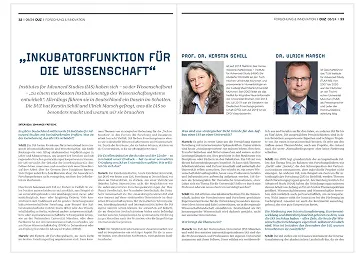
There are 23 IASs in Germany, each with distinct focuses, objectives, funding structures, and institutional affiliation. However, they all share a common goal: to promote and support research excellence and talent. After the COVID-19 pandemic, interactions intensified again, with meetings held near Bremen in 2023 and Essen in 2024. These gatherings provided an opportunity to exchange experiences, discuss shared challenges, and evaluate the pros and cons of the various funding models.
In an extended interview with the “Deutsche Universitätszeitung” (German University Magazine, No 8 / 2024, circulation 20,000), Kerstin Schill (Professor for Cognitive Neuroinformatics and Director of Hanse Wissenschaftskolleg Delmenhost / IAS) and Ulrich Marsch (Managing Director of TUM-IAS) discussed the crucial role of IAS in German science, emphasizing its incubator function for emerging research topics.
IAS Princeton, New Jersey / USA
The first institute of its kind, the Institute for Advanced Study in Princeton, inspired the creation of the TUM-IAS. Strong relationships have existed for some time with other IASs in the UK and Canada. An initial meeting with David Nirenberg (Director and Leon Levy Professor at the Institute for Advanced Study) in Munich in February was later continued in Princeton in November. Together with his management team, questions and opportunities for collaborative research were discussed, as well as potential consequences of Donald Trump’s new presidency, ongoing scientific developments, and future collaboration prospects.

Right-Picture: Einstein statute at Princeton garden. Left to right: Michael Molls, Morwenna Joubin, Ulrich Marsch. Images: TUM-IAS
Seminar Series of European Universities on Sustainability
In its commitment to fostering sustainability and addressing related challenges across various disciplines, the TUM-IAS has continued the Seminar Series of European Universities on Sustainability, which was launched in the autumn of 2023. A total of six scientists from the National Technical University of Ukraine, Poznań University of Life Sciences in Poland, Riga Technical University in Latvia, the University of Freiburg, and the Tallinn University of Technology in Estonia presented an overview of their research during our weekly Wednesday Coffee Talk series.
In 2024, we continued our seminar series with these talks:
- Prof. Serhii Voitko (National Technical University of Ukraine)
Sustainable development methodology as a tool for researching the state of countries and making decisions, January 31, 2024 - Dr. Victoria Takacs (Poznań University of Life Sciences, Poland)
Stakeholder engagement in nature conservation science – need or must?, May 29, 2024 - Prof. Inga Zicmane (Riga Technical University, Latvia), Prof. Svetlana Beryozkina (College of Engineering and Technology, American University of the Middle East, Kuwait)
Go2Green – Towards Sustainable and Clean Energy Transition, June 26, 2024 - Prof. Michael Zgurovsky (National Technical University of Ukraine, “Igor Sikorsky Kyiv Polytechnic Institute”)
Main Threats to the Sustainable Development of Global Society in a Conflicting World, October 30, 2024 - Dr. Neelesh Yadav (Tallinn University of Technology, Estonia)
Partial Power Converter and Its Emerging Applications, December 4, 2024
TUM-IAS Fellowship Call
Anticipating the arrival of our new Fellows in 2025, we reflect on the 16 Fellowships granted in 2024 distributed among various Fellowship categories: Hans Fischer (Senior) Fellowship, Dieter Schwarz Fellowship, Dieter Schwarz Courageous Research Grant, Rudolf Diesel Industry Fellowship, Anna Boyksen Fellowship, Albrecht Struppler Clinician Scientist Fellowship, and Philosopher in Residence Fellowship.
We are delighted to welcome these newly appointed Fellows from Australia, China, Denmark, Germany, Great Britain, Italy, Turkey, and the USA!
To learn more about our newest Fellows, please consult the chapter “Welcoming Our New Fellows.”
Rudolf Mößbauer Tenure Track Assistant Professorships
For over a decade, TUM has been selecting promising young talents as Tenure Track Assistant Professors (W2) after a thorough selection process organized by the TUM-IAS. The TUM Faculty Tenure Track represents a performance-oriented career model for young scientists with international experience, providing the realistic prospect of advancing to a tenured W3 professorship from the beginning.
This TUM-IAS Fellowship is named in honor of TUM professor Rudolf Mößbauer (1929–2011), a Nobel Prize laureate in Physics (1961) for his groundbreaking research concerning the resonance absorption of gamma radiation and his associated discovery of the effect that bears his name. As the emphasis of the Professorship lies on the creative development of a new field of science and / or technology, and as we intend to offer those young researchers the best possible career start, they are equally affiliated with the TUM-IAS as Fellows.
In 2024, four new Rudolf Mößbauer Tenure Track Assistant Professors were appointed. For detailed information on our new Fellows, please see chapters “Events” and “Welcoming Our New Fellows.”
Visiting Alumni Fellowship
Following the COVID-19 pandemic, we have relaunched the Alumni Visiting Fellowships to allow our Alumni Fellows to stay in touch with their former hosts, enter into long-term collaborations, or plan new projects. The Start-up Fund funds workshops and seminars to plan new projects and meet with participating researchers. 16 Fellows took advantage of these new offers in 2024.
TUM Ambassadors
Many international scientists have enriched our university with their expertise and experience over the past decades. Since 2013, once a year, the President awards the honorary title of “TUM Ambassador” to those who have particularly enriched TUM with their scientific expertise and international experience during their stay. They are links between TUM and the international academic research and industry community. The dedicated participation of TUM Ambassadors as ambassadors and advisors strengthens our global network and promotes the exchange of knowledge on an international level. TUM Ambassadors are Members of our TUM-IAS and can apply for annual funding to return to TUM for research and guest stays.
2024 Ambassadors are:
- Gustavo Henrique Goldman, Alumnus TUM-IAS Hans Fischer Senior Fellow and Universidade de São Paulo, Brazil
- Ron M. A. Heeren, TUM-IAS Hans Fischer Senior Fellow and Maastricht University, Netherlands
- Noelle Selin, Alumna TUM-IAS Hans Fischer Senior Fellow and Massachusetts Institute of Technology, USA
- Henrik Selin, Alumnus TUM-IAS Hans Fischer Senior Fellow and Boston University, USA
- Iris Tommelein, University of California, Berkeley, USA
Outreach
TUM-IAS has undertaken a variety of activities to promote its outreach further. We participated in the TUM Sustainability Day and the Open Doors Day with presentations. We continued and expanded the new series of video portraits of our fellows which can be watched on our website. Together with Siemens, we presented the work of our Siemens-supported Fellows in several podcasts. In our weekly “Wednesday Coffee Talks: Scientists meet Scientists,” we presented current research topics of our Fellows from TUM to an interested scientific public. Three times a year, the “Garching Talks,” organized by TUM-IAS, present scientific topics to a broader circle of interested citizens from the city of Garching.
Michael Nobel: An entrepreneur, philanthropist, and friend of the TUM-IAS
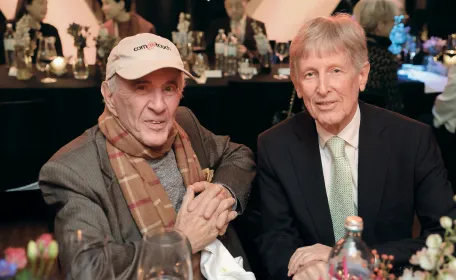
Michael Nobel (born February 3, 1940) was a great-grandnephew of Alfred Nobel. He co-founded the Nobel Sustainability Trust (NST) in 2007 with other members of the Nobel family.
After studying psychology at the University of Lausanne, Michael Nobel worked as a researcher in social sciences at the Institute for Mass Communication at the University of Lausanne, as well as a consultant to UNESCO in Paris and the United Nations Division of Social Affairs in Geneva, focusing on methods for substance abuse prevention. As an entrepreneur, he played a key role in bringing a novel nuclear magnetic resonance imaging method to market maturity.
In later years, he dedicated himself to sustainability, especially in renewable energy and clean tech sectors, as an advisor and board member for international companies and NGOs.
In 2022, the Nobel Sustainability Trust officially entrusted TUM and its Institute for Advanced Study as an academic partner to lead the international selection process for the Sustainability Awards.
We mourn the passing of a dear friend and supporter. We will remember him as a warm-hearted, sharp-thinking, and creative individual whose vision of sustainability was rooted in the harmony of technological progress, nature conservation, and economic prosperity.
Awards
We are delighted and proud that our Fellows and Members have again received top-class awards in 2024.
ERC Synergy Grant for TUM-IAS Fellow Daniela Pfeiffer
Daniela Pfeiffer (TUM-IAS Albrecht Struppler Clinician Scientist Fellow and Professor for Radiology at TUM) and the project SmartX received an ERC Synergy Grant of up to 10 million euros.
The SmartX project is researching more detailed imaging procedures to diagnose lung diseases better and earlier. The focus is on chronic obstructive pulmonary disease (COPD). Conventional X-rays and CT scans are often inadequate for the early detection of COPD and are associated with high radiation doses. The project aims to develop a new type of detector for the dark-field X-ray procedure that requires 50 percent less radiation dose than the already low-radiation procedure. An X-ray detector is the counterpart to the radiation source and produces the X-ray image. While conventional X-rays are based on the attenuation of the X-ray light, the dark-field X-ray developed at TUM uses the so-called small-angle scattering of the X-ray light. This allows additional information to be obtained about the nature of the microstructure of the lung tissue.
Project partners are the Instituto de Biomedicina in Valencia / Spain and the EPFL in Lausanne.
ERC Consolidator Grant for Rudolf Mößbauer Tenure Track Assistant Professor Andreas Reiserer and former Mößbauer Professors Michael Knap and Matthias Nießner
Andreas Reiserer (Professor for Quantum Networks at TUM) won his Consolidator Grant for his project OpENSpinS, aiming to combine the wide bandwidth and long reach of photons (light particles) with the reliable and long-lasting storage of qubits in silicon. Silicon, well-known as the standard material in microelectronics, serves as the foundation. Instead of electronic spins, the team aims to use the durable nuclear spins of erbium atoms, which can be entangled using light. This approach seeks to enable qubits to be interconnected over greater distances – a critical step towards building larger quantum networks.
Michael Knap’s (Professor for Collective Quantum Dynamics at TUM) project DynaQuant investigates how specific properties of quantum states can be leveraged to develop more robust and efficient systems. The focus is on topological quantum states with particularly exotic properties. The aim is to develop new methods to better understand the behavior of these states, especially under non-equilibrium conditions. The results could contribute to the development of new quantum technologies and significantly advance secure data processing.
Matthias Nießner (TUM-Professor for Visual Computing) is tackling the following challenge in his project Gen3D: Learning to Create Virtual Worlds: Until now, creating realistic 3D content has been very time-consuming and labor-intensive. Previous methods for automating the process do not come close to the quality of the work of artists who design virtual worlds by manual labor. Matthias Nießner develops generative models that generate 3D polygon meshes and their surface textures and material properties. These models can be used directly by modern graphics systems. He uses images and videos as training data. As these only partially show the 3D world, the models must also learn to deal with incomplete data.
Medical AI researcher Daniel Rückert receives the Leibniz Prize
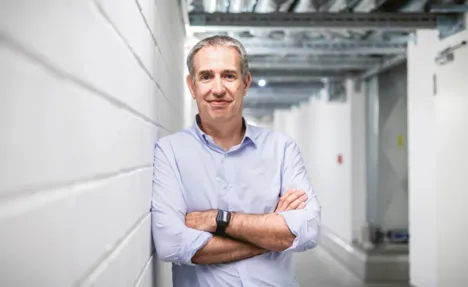
IAS-Member Daniel Rückert (TUM-Professor of Artificial Intelligence (AI) in Medicine and Healthcare) has been honored for his research on AI-assisted medical imaging. The most important German research prize is endowed with 2.5 million euros by the German Research Foundation (DFG). Daniel Rückert has developed pioneering methods with which AI algorithms can generate particularly informative images from computer tomography or magnetic resonance imaging, analyze them, and interpret them for improved medical diagnostics. Supported by the Alexander von Humboldt Foundation, TUM brought the top scientist from Imperial College London to Munich in 2020. Daniel Rückert studied computer science at the Technical University of Berlin and received his doctorate from Imperial College London in 1997. He was Professor of Visual Information Processing and Dean of the Department of Computing at Imperial College. He has published numerous highly cited scientific articles, led several large research projects, and is the founder of a start-up that uses his research results for faster and more precise clinical trials of drugs.
TUM Golden Ring of Honor for TUM-IAS Director Michael Molls
The highest award that TUM can bestow, the Golden Ring of Honor, was awarded to TUM-IAS Director Michael Molls. He receives the award in recognition of his many years of service to science. From 1992 to 2014, Michael Molls was Professor and Director of the Clinic for Radiotherapy and Radiation Oncology at the TUM University Hospital rechts der Isar. As co-spokesperson, Michael Molls has been responsible for the biomedical research area of the Munich Center for Advanced Photonics (MAP), a Cluster of Excellence of the German Research Foundation. In 2016, he was elected as chairperson of the TUM Senior Excellence Faculty, with a seat on the TUM Extended Board of Management and the Board of TUM. Since 2020, he has served as Director of the TUM Institute for Advanced Study.
TUM President Thomas Hofmann said: “Although he officially ‘retired’ more than 10 years ago, his commitment remains undiminished. As Director of the TUM Institute for Advanced Study and Speaker of the TUM Senior Excellence Faculty, he continues to be one of the most dynamic and creative minds at our university. His work is living proof that scientific excellence and innovation are timeless.”
The Golden Ring of Honor of the TUM is a prestigious award that is presented to persons who have far surpassed their duty in making outstanding contributions to research, teaching, the promotion of young scientists, or educational and university policy. Personalities such as Eberhard von Kuenheim (former CEO of BMW AG) or Rudolf L. Mößbauer (Nobel Prize Physics 1961) also received the Golden Ring of Honor.
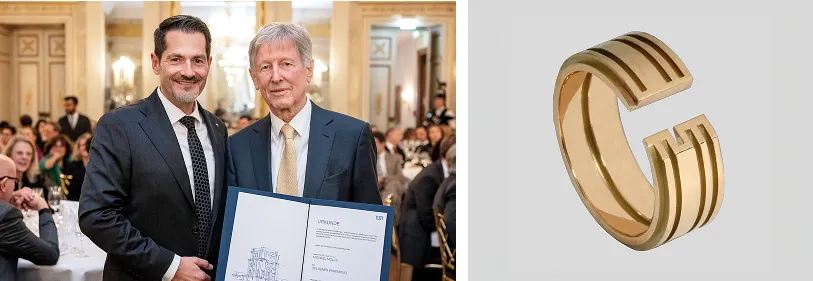
TUM Golden Ring of Honor. Image: Uli Benz
Highly Cited Researchers
When scientists write research papers, they cite the most important papers that have already been published. Therefore, the total number of times a paper is cited is a good indicator of the quality of the research. To identify the most highly cited researchers, the US company Clarivate annually analyzes its Web of Science database, which covers scientific publications in various disciplines.
The latest evaluation lists the scientists who were cited most frequently in their subject areas in the period from 2013 to 2023. Researchers frequently cited in multiple fields are listed in the Cross-Field category. The list contains the names of about 6,900 persons in no specific order, including the following TUM-IAS Fellows or Alumni Fellows:
• Laura Herz (Cross-Field), University of Oxford, Alumna TUM-IAS Hans Fischer Senior Fellow
• Ingrid Kögel-Knabner (Cross-Field), Alumna TUM-IAS Carl von Linde Senior Fellow
• Bernhard Küster (Cross-Field), Alumnus TUM-IAS Carl von Linde Senior Fellow
• Melanie Schirmer (Cross-Field), TUM-IAS Fellow as Rudolf Mößbauer Tenure Track Assistant Professor
• Robert Schmitz (Cross Field) University of Georgia, TUM-IAS Alumnus Hans Fischer Fellow
• Thaddeus S. Stappenbeck (Cross-Field), Washington University, Alumnus TUM-IAS Hans Fischer Senior Fellow
• Ib Chorkendorff (Chemistry), DTU Copenhagen, Alumnus TUM-IAS Hans Fischer Senior Fellow
• Yang Shao-Horn (Chemistry), MIT, TUM-IAS Hans Fischer Senior Fellow
• Yang Shao-Horn (Environment and Ecology), MIT, TUM-IAS Hans Fischer Senior Fellow
• Naomi Halas (Material Science), Rice University, Alumna TUM-IAS Hans Fischer Senior Fellow
• Peter Nordlander (Material Science), Rice University, Alumnus TUM-IAS Hans Fischer Senior Fellow
Euler medal for former TUM-IAS Director Ernst Rank
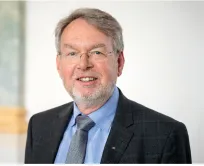
Ernst Rank, Professor emeritus for Computation in Engineering and former TUM-IAS Director, has been awarded the Euler medal by the European Community on Computational Methods in Applied Sciences (ECCOMAS). He was awarded the medal during the ECCOOMAS Congress in Lisbon / Portugal in June 2024. The Euler medal, one of the highest distinctions of the society, is awarded for outstanding and sustained contributions to the area of computational solid and structural mechanics.
Carl Friedrich von Siemens Research Award for Noelle Eckley Selin
Noelle Eckley Selin (Alumna TUM-IAS Hans Fischer Senior Fellow and Professor at the Institute for Data, Systems, and Society at MIT) has been awarded the prestigious Carl Friedrich von Siemens Research Award by the Alexander von Humboldt Foundation. The prize is awarded to internationally leading researchers of all disciplines from abroad in recognition of their academic record.
She is internationally known for her research contributions to atmospheric chemistry and sustainability science. Noelle Selin has developed and applied models tracing the conceptual pathways by which policies to mitigate air pollution and climate change affect the atmosphere, human health, and society. She developed the first global coupled land-ocean-atmosphere simulation of mercury pollution, using the GEOS-Chem chemical transport model, now used worldwide to answer this question. Working with political scientists, she has examined how science can inform policy processes, empirically testing how models affect decision-making and engaging with communities in shaping, conducting, and communicating research.
Polina Bayvel (University College London, UK) and Meisong Tong (Tongji University, Shanghai) honored with the Carl Friedrich von Siemens Research Award by the Alexander von Humboldt Foundation – and as such, Member of the TUM-IAS
Multi-wavelength optical networks form the foundation of the global digital information infrastructure. In 1994, Polina Bayvel, Professor of Optical Communication, founded the Optical Networks Group (ONG) at University College London, which developed into a leading research institution in high-speed communication over optical fiber networks. The Humboldt Research Award will intensify cooperation on using multi-mode fiber for long-range optical transmission technology and expanding communication via standard single-mode fiber to non-conventional bands to multiply transmission capacity. Gerhard Kramer hosts Polina Bayvel at the Technical University of Munich, Chair of Communications Engineering.
Meisong Tong is well known internationally for his outstanding research in computational electromagnetics and related topics. He has significantly contributed to developing the state-of-the-art Nyström and meshless methods for solving electromagnetic problems. He pioneered the derivation of closed-form formulas for calculating hypersingular integrals of electromagnetic integral equations, enhancing those numerical methods to a new level. During his stay in Germany, he intends to develop robust singularity treatment techniques for more challenging tetrahedral elements and apply them to inverse source methods. Professor Thomas F. Eibert hosts Professor Tong at the Technical University of Munich, Chair of High-Frequency Engineering.
As award winners of the Alexander von Humboldt Foundation, both are members of the TUM-IAS.
Lisa Adams (TUM-IAS Albrecht Struppler Clinician Scientist Fellow and Senior Physician at Radiology at TUM University Hospital) won two grants from “Bayern Innovativ,” totalling 700.000 euros.
Réne Botnar, TUM-IAS Hans Fischer Senior Fellow and Professor of Biomedical Engineering at King’s College London, gained the 2024 Research Award of the Faculty of Engineering, Pontificia Universidad Católica de Chile and a Gold Medal from the Society for Cardiovascular Magnetic Resonance, Washington DC. In addition, he receives a Fondecyt Regular 2025 grant from Chile, for his project “Towards a 20 min Cardiac MRI Exam at 0.55T: simple, efficient and affordable.”
TUM-IAS Alumnus Fellow Ioannis Brilakis (Professor of Civil and Information Engineering at the University of Cambridge) received the prestigious Tucker-Hasegawa Award of the International Association for Automation and Robotics in Construction and has been elected IAARC President by its Board of Directors in June 2024.
Dennis Christensen, TUM-IAS Hans Fischer Fellow and Professor of Energy Conversion and Storage at DTU Copenhagen, won the 2024 Promising Early Career Scientist award from the journal Materials Today Energy, rewarding “early career scientists” outstanding scientific work in energy materials.
Kim-Melanie Kraus (TUM-IAS Albrecht Struppler Clinician Scientist Fellow and Radiation Oncologist at the TUM University Hospital) received a research grant for 243,150 Euros from Varian, a major commercial player in radiotherapy. The project further advances treatment planning in Microbeam radiotherapy.
At the International Symposium on Quality Electronic Design 2024, TUM-IAS Rudolf Diesel Industry Fellow Sani Nassif gained the best paper award for his contribution “Toward Early Stage Dynamic Power Estimation: Exploring Alternative Machine Learning Methods and Simulation Schemes.”
Heather Kulik, TUM-IAS Hans Fischer Senior Fellow and Professor for Chemical Engineering at MIT, received US President Joe Biden's Presidential Early Career Award for Scientists and Engineers. Also, she was Sydney Ross Lecturer 2024, Rensselaer Polytechnic Institute, Department of Chemistry, Löwdin Lecturer for 2023 at Uppsala University, Sweden, Department of Chemistry, and TCI Hirschfelder Visitor / Lecturer, Department of Chemistry at University of Wisconsin.
Mathias Senge, TUM-IAS Hans Fischer Senior Fellow and Professor for Organic Chemistry, Trinity College Dublin, is evaluated as among the World’s Top 2 percent Scientists worldwide for 2024 by Elsevier Publishing and Stanford University. He also gave an invited keynote lecture at the Gordon Research Conference “GRC Tetrapyrroles” (2024).
TUM-IAS Hans Fischer Senior Fellow Piotr Tryjanowski (Poznań University of Life Sciences) received the “Gold Synapsy Award” on his book “ECOPSYCHIATRY” as the innovation book of the year.
Events
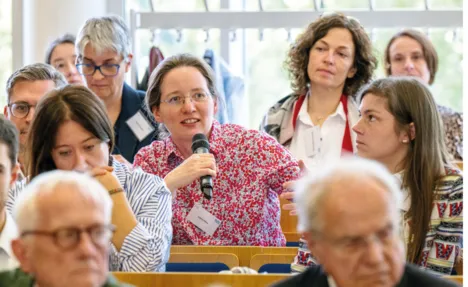
Image: Astrid Eckert, TUM
Seminars, workshops, conferences – these are core tasks of the TUM-IAS. Many of our Fellows had multi-day conferences on their research topics in 2024. In addition, TUM-IAS hosts over 200 workshops and conferences of TUM’s academic community annually. Public outreach was an important focus last year, with a SustainabilityDay, an Open Day, and lectures in our neighboring town of Garching. We continued our “Scientists meet Scientists” seminar series online on Wednesdays, with over 20 lectures annually.
General Assembly
At our annual meeting, we welcome our new Fellows, learn about ongoing projects in presentations, and create a platform for our Fellows to network. Doctoral students present their topics in poster sessions.
Will Schilders gave last year’s Linde Lecture. He is one of the Hans Fischer Senior Fellows at TUM-IAS, funded by Siemens AG, and a Professor of Scientific Computing in Eindhoven. His topic was: Mathematics: Key Enabling Technology for a Better World, in which he addressed the key role of mathematics for almost all current and future applications.
Full Program
Simulation of Quantum Systems on High-Performance Computing Infrastructures, Örs Legeza, Wigner Research Centre for Physics, Hans Fischer Senior Fellow
The Role of Bacterial Oral-Gut Translocation in Inflammatory Diseases, Melanie Schirmer, TUM, Rudolf Mößbauer Tenure Track Assistant Professor
Women in the Industry 4.0 – Current and Future in Manufacturing, Jihyun Lee, University of Calgary, Anna Boyksen Fellow
From Injury to Integrity: From Biomechanics to Molecular Biology of Intestinal Wound Healing, Philipp-Alexander Neumann, TUM, Albrecht Struppler Clinician Scientist Fellow
China and the Changing International Order, Susan Park, University of Sydney, Hans Fischer Senior Fellow
Exploring Quantum Spin Liquids: From Majorana Fermions to Exotic Phases, Natalia Perkins, University of Minnesota, Hans Fischer Senior Fellow
Traffic State Prediction using Machine Learning and Automated Vehicle Data, Felix Rempe, BMW, Rudolf Diesel Industry Fellow
Nobel Sustainability Summit
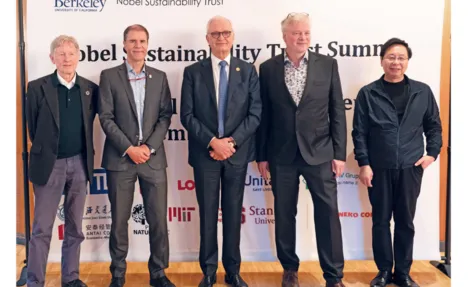
The fourth Nobel Sustainability Trust Summit took place at the University of California, Berkeley, on November 20 and 21, 2024. The Nobel Sustainability Trust (NST), the University of California, and the Berkeley Center for Responsible, Decentralized Intelligence (Berkeley RDI) jointly organized the event.
The summit brought together a full assembly of thought leaders, innovators, and changemakers to address crucial technological, sustainability, and human development challenges. The Award Ceremony of the Sustainability Awards 2024, supported by the NST, took place on the first day after a morning session of roundtables composed of experts from the financial, entrepreneurial, political, and academic sectors.
Rich Lyons (Chancellor of the UC Berkeley), Siddharth Chatterjee (UN Resident Coordinator in China), Eduard Barbier (Colorado State University), John Eleoterio (Global Head of Sustainability Banking, Goldman Sachs), Philippe Douste-Blazy (former French Minister of Health, and Foreign Affairs), Edward Russo (former Environmental Advisor of Donald Trump), James Mwangi (CEO and Group Managing Director of Equity Bank, Kenya), and many other persons were among the prominent international speakers and panelists.
The three winners of the Sustainability Awards 2024 are:
Dr. Mathis Wackernagel (Global Footprint Network) is responsible for developing the ecological footprint concept and advisory work favoring sustainability for public organizations, businesses, and decision-makers.
Prof. Klaus Butterbach-Bahl (Aarhus University / Karlsruhe Institute of Technology) for his research on nitrogen cycles and greenhouse gas emissions at regional and global levels, particularly their agricultural and ecological impact.
Prof. Jiuhui Qu (Chinese Academy of Sciences / singhua University) for his pioneering work in developing water treatment technology and risk management.
Furthermore, the NST presented its Outstanding Contribution to Sustainability medal, a recognition and symbolic prize for personalities engaged in sustainability projects. This year, the medals went to Dr. Claudia Sheinbaum (President of Mexico and former Mayor of Mexico City) and to Ban Ki-moon (former Secretary-General of the UN).
The second day was dedicated to the Nobel DAO. This technology accelerator brings together young talents worldwide in digitalization, artificial intelligence, longevity medicine, space technology, robotic automation, and green energy.

TUM – Siemens Workshop
With the move of Siemens Corporate Research to the TUM research campus, the long-standing relationships are deepening even further. In the first workshop in January 2024, over 30 researchers from Siemens and TUM met to develop new fields of joint work and initiate projects.
Munich Battery Discussion
On March 4–5, the Munich Battery Discussions 2024 brought together 20 international experts in battery research to discuss the latest findings and the tone for the upcoming years with the audience, comprising international scientists from Academia, Research Institutes, and Industry. Close research and industry collaboration are critical to potent innovation and successful industrialization. In the framework of this collaboration, BMW and TUM jointly organized the MBD 2024, supported by TUMint.Energy Research.
The contributions addressed the challenges and opportunities of future lithium-ion batteries from different approaches, ranging from experimental to simulation studies, fundamental investigations, and the analysis of complex systems. In addition to the incremental developments in state-of-the-art lithium-ion batteries, a growing focus and increasing resources are also being invested in developing next-generation concepts such as the All-Solid-State batteries technology.
The 9th edition of the MBD was dedicated to the “Design and Production of Next-Generation Batteries: Challenges and Opportunities,” focusing on bridging the gap between fundamental science and scale-up to serial industrialization. For the first time in the satisfactory history of the conference, the topic of production technology also was in boosted focus.
Since its beginnings in 2013, the MBD aims to discuss the latest findings and the tone for the upcoming years with an audience comprising international scientists from Academia, Research Institutes, and Industry.
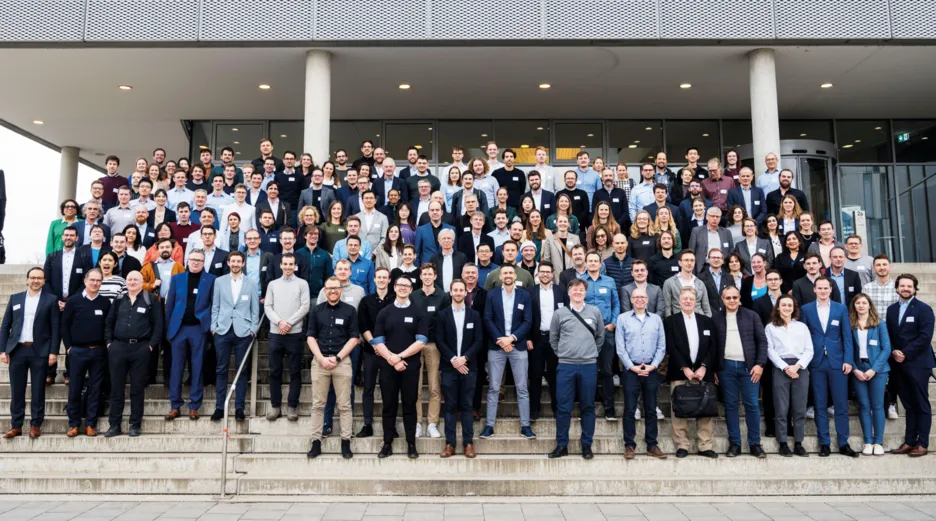
Embracing Nature’s Complexity Conference – How to communicate the value of water- and climate-regulating ecosystems?
Water transport and cloud formation are essential in climate regulation. In turn, they depend on vegetation covering the earth's surface. This plays a major role in weather patterns and extremes, especially floods and droughts. During the 5-days conference in April, physicists, hydrologists, ecologists, medical scientists, and atmospheric and climate scientists from over 20 countries strived to overcome the traditional separations among these disciplines. They exchanged new evidence on how human activities on land affect rain and climate and our overall well-being. The conference was the culmination of Anastassia Makarieva’s TUM-IAS Anna Boyksen Fellowship on “Drought mitigation through ecosystem restoration,” which focused on the Bionic Pump concept she co-developed. In co-authorship with V.G. Gorshkov, Anastassia Makarieva formulated the idea of the biotic pump of atmospheric moisture, highlighting key ecological feedbacks on atmospheric moisture transport and, in cooperation with an international team of colleagues, demonstrated the existence of life’s metabolic optimum (broadly universal rate of energy consumption across life’s kingdoms). Combining theoretical work with field observations, Anastassia spent over sixty months researching forests in the Russian wilderness. Her current research interests focus on deepening the physical understanding of ecosystem feedback on the water cycle and moisture transport.
See also:
www.thebioticpump.com/tum-ias-conference-2024
Read session summaries and download transcripts at https://bioticregulation.ru/life/conf2024.php
See videos from the conference at www.youtube.com/@thebioticpump
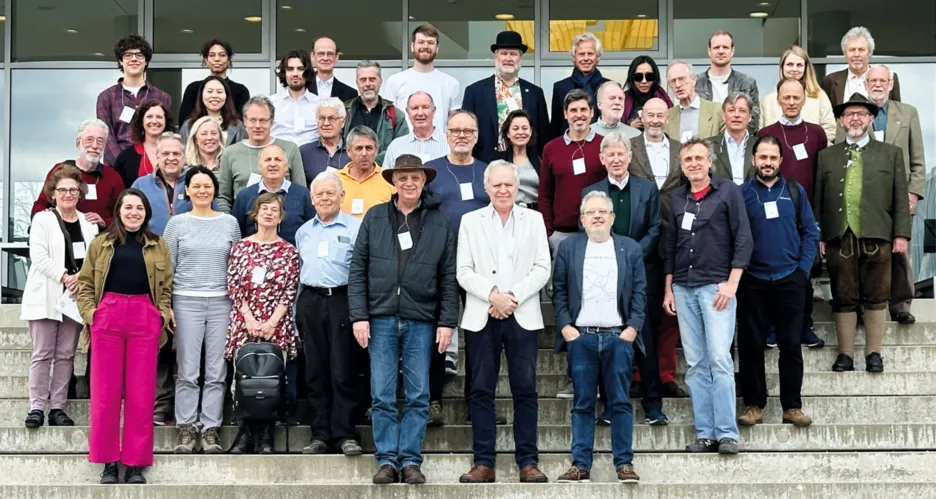
Workshop “Advocates and Allies: Male Allies for Gender Equality”
TUM-IAS Hans Fischer Senior Fellow Gregory D. Erhardt, Professor of Civil Engineering in Kentucky, brought a new focus to TUM with this workshop in May 2024.
He claimed that we are all aware that women continue to be underrepresented in the sciences, the path toward addressing this issue differs across demographic groups. Traditionally, much of the advocacy is done by women. Since men dominate faculty demographics on campus, however, this group needs to be involved in any change in social norms. While many men do care about and understand gender diversity issues, they may not possess the understanding, vocabulary, or skills to turn their good intentions into actions.
This workshop took a new approach, focusing on how men can be better advocates and allies of women in the workplace. The course was taught by men, creating a depolarizing environment for a freer exchange of ideas. It covered topics including implicit bias, work culture, effective communication, and dealing with pushback. For each topic, best practices were discussed, allowing for the discussion of relevant examples and providing guidance for future activities.
Recent progress on tensor network methods
Hans Fischer Senior Fellow Örs Legeza, Professor at Wigner Research Centre for Physics, Budapest, and his host Gero Friesecke, Professor for Analysis at TUM, were organizing a four-day workshop at the IAS on “Recent progress on tensor network methods” together with colleagues Thomas Barthel of Duke University and Henrik Larsson from the University of California.
The workshop brought together condensed matter physicists, mathematicians, and theoretical chemists to continue the exploration of this active and growing field of research and to stimulate further developments of tensor network methods.
The workshop focused on innovative ideas for moving beyond the current limits of quantum many-body simulations despite the major challenges of high dimensionality and accuracy. Topics include the interplay between modes, rank truncation network topology, hybridization with other approaches, and parallelization.
Orbitrap Isotope Applications Workshop
TUM-IAS Anna Boyksen Fellow Andrea Erhardt, Professor of Earth and Environmental Science at the University of Kentucky, organized a workshop on the Orbitrap Isotope Solutions platform in April 2024. This one-and-a-half-day workshop covered innovations, new techniques, problems encountered, and potential solutions to this system. The second day of the meeting focused on live demonstrations.
Conference on Water Security in Africa – An integrated Water-Energy-Food-Ecosystems (WEFE) Nexus perspective
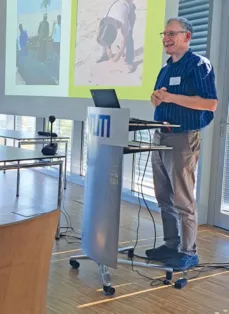
In May 2024, TUM-IAS hosted a conference on water security in Africa, supported by the Bavarian State Government. Increasingly severe climate change impacts, especially drought and flood conditions, coupled with inadequate management of water resources, negatively impact water security and livelihoods in parts of Africa. This is causing mass migrations of populations and violent conflict, fueling governance conditions' instability. Augmented water security is key for ecosystem regeneration and sustainable socio-economic development in Africa and beyond. Water reclamation with integrated resource recovery taking a Water-Energy-Food-Ecosystems (WEFE) Nexus approach to support the regeneration of ecosystems is also a significant opportunity to facilitate the achievement of the UN Sustainable Development Goals (SDGs). However, the operationalization of the Nexus approach is lagging.
The keynote speech was given by Tony Rinaudo, a multi-award-winning agricultural scientist from Australia who received the Right Livelihood Award in 2018.
The Deep Structure of Transatlantic Relations
In June, Eugénia da Conceição-Heldt (TUM-IAS Carl von Linde Fellow and TUM Professor of European and Global Governance) and international experts explored in this 2-day workshop, how much cooperation between Europe and the USA takes place, to what extent it is efficient, how profits and losses are distributed, and what the future of collaboration might look like.
Sustainability Day
The TUM-IAS was represented with scientific lectures at the first TUM-wide Sustainability Day on June 12. David Egger, TUM-Professor of Theory of Functional Energy Materials and part of IAS Focus Group Optoelectronic Properties of Perovskite Semiconductors, presented to Perovskite Semiconductors and solar pholtaic efficiency. Manuel Spitschan, TUM-IAS Fellow as Rudolf Mössbauer Tenure Track Assistant Professor of Chronobiology & Health, reported to “Light and Health.”
International workshop on “Existential Elucidation. Jaspers and Spiritual Care”
TUM-IAS Philosopher in Residence Rico Gutschmidt conducted, together with his TUM Host Eckhard Frick (Professor of Spiritual Care and Psychosomatic Health), an interdisciplinary workshop on June 14–15 at the TUM University Hospital rechts der Isar. A group of international scholars (Philosophy, Psychology, Medicine, Literary Studies) interpreted Spiritual Care against the background of Jaspers’ concept of the boundary situation.
The German philosopher Karl Jaspers (1883–1968) introduced the term “boundary situation,” which refers to the limits of action and life, such as struggle, guilt, suffering, and death. Human life always remains within these boundaries, but this is experienced specially in particular situations. Patients who have to endure severe physical or emotional suffering or are confronted with their death due to a terminal illness can experience their situation as a boundary situation in the sense of Karl Jaspers. According to Jaspers, in confronting boundary situations, people can gain “existential elucidation,” a new and transformative perspective on their lives.
At the workshop, Alice Holzhey-Kunz (Zurich), Giovanni Pietro Basile (Boston), Hilmar Schmiedl-Neuburg (Boston), Heidi Frølund Pedersen (Aarhus), Emmy van Deurzen (London), Godehard Brüntrup (Munich), An Ni (Beijing), and the two organizers discussed the question of how to support people in boundary situations from a philosophical, spiritual and psychological perspective. A central concern of the workshop was to establish ways of interrelating secular-existential and religious-spiritual forms of support. The workshop papers will be published in the series "Studies in Spiritual Care" by De Gruyter.
Multiphontonics Conference
The first Multiphotonics meeting took place on July, 4 and 5, 2024. Elena del Valle, TUM-IAS Hans Fischer Fellow and Professor of Theoretical Condensed Matter Physics in Madrid, initiated it. With over 40 participants various topics were discussed, e. g.: Multiphoton generation: Single and N-photon emission; Quantum light generation with properties such as entanglement or squeezing; Frequency filtering, statistics, coherence and correlation measurements; Quantum optics, cavity-QED, light-matter interaction and nanophotonics.
Workshop “Fabricating Archaeologies: Feminist Craft, Human Hands, and Intelligent Architectures”
Workshop by TUM-IAS Anna Boyksen Fellow Nathalie Bredella with Andrea Reichenberger (TUM School of Social Sciences and Technology, History of Technology), Rudolf Seising (Deutsches Museum), July 2024.
Evolving digital ecologies promise to situate technologies, software systems, and mixed actors within new epistemological approaches. Locating digital production processes within feminist labor histories, this workshop aimed at interrogating the narratives surrounding computation, the relationships between craft and digital production, and the subsequent interconnections between the human and the machine. In looking at histories of software systems as craft archaeologies, the organizers were interested in the hybrid modes of computation and construction, as well as in the methods of writing these situated histories.
Using a wide set of methodologies (oral history, media archaeology, technical re-enactment, archival research), the workshop brought together historical and theoretical investigations and to bridge the gap between the history of craft, computer science and artificial intelligence (AI). The questions immediately arose: What tensions have arisen around the automation of craft processes and mechanized calculation procedures? In what ways is the emphasis on productivity entangled with marginalization? How can we capture (situate) industrial and digital practices across disciplines? And what role do theories of contextual knowledge in a feminist framework play in the realm of diversity and epistemic (in)justice? Bringing together perspectives from architecture and technology studies, this workshop highlighted how technical, social, and societal elements interweave, investigating how material processes form communities.
Responsible Science Communication and AI
The rapid advance of AI over the last year has been greeted with both excitement over its possibilities and dismay about the rapidity with which it is being incorporated into various aspects of our lives. How can science communicators discuss such quickly evolving innovations when both potential benefits and potential negative impacts are unclear and future developments are impossible to predict?
This hands-on interactive workshop in July, organized by TUM-IAS Hans Fischer Senior Fellow Maja Horst, Professor of Science, Technology, Society and Dean of Arts at Aarhus University, explored what a Responsible Innovation framework might contribute to understanding some of the unique opportunities and challenges of responsible science communication in the field of AI.
Leibniz Quantum and Beyond
A workshop on Gottfried Wilhelm Leibniz in September 2024 dealt with his work on later quantum research and relativistic physics and his influence on medicine and philosophy. The workshop took place with the Leibniz Society, Hanover, and was organized by TUM Philosopher in Residence Roberto Giuntini, Professor of Philosophy at the University Caligari, Italy.
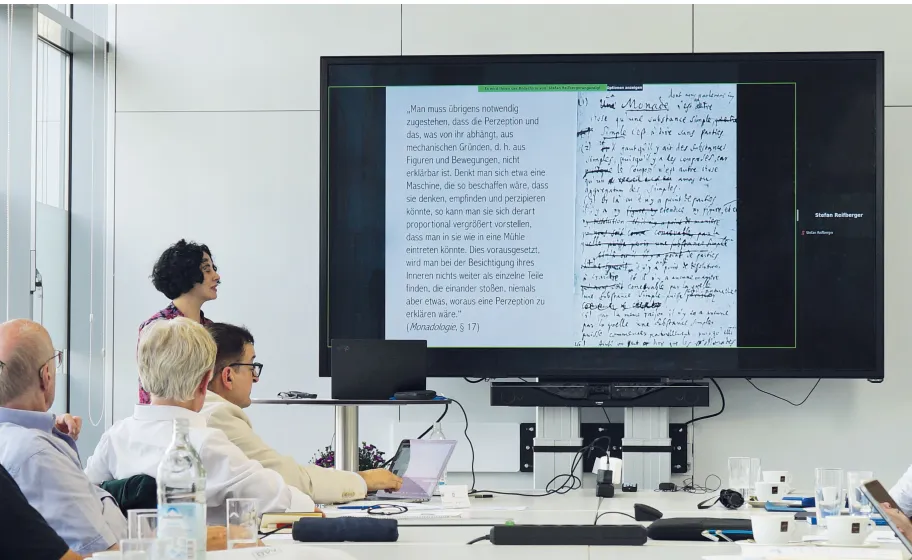
Workshop “Link it and move it” at Deutsches Museum München
“Link it and Move it” is a collaboration between the TUMlab at the Deutsches Museum and TUM-IAS Anna Boyksen Fellow Nathalie Bredella, Professor of History and Theory of Architecture at Leibniz University Hanover. Together with Grayson Bailey, Merel de Coorde, and Jonah Marrs, she led a workshop exploring the history of Laura and Leonardo Mosso’s “Programmable Architecture” through robotic re-enactment. The workshop, directed at teenagers and young adults, brought together architectural history by presenting a comic illustrating the life and work of the Mossos, followed by an Arduino workshop.
Advancing Scientific Machine Learning in Industry
In this joint academia-industry workshop, Wil Schilders and Dirk Hartmann explore recent advancements in implementing Scientific Machine Learning techniques.
Wil Schilders, whose Hans Fischer Senior Fellowship has been supported by Siemens AG, is a Mathematics and Computing Science Professor at Eindhoven University in the Netherlands. Dirk Hartmann is Head of Simcenter Technology Innovation, Siemens Technical Fellow, and a Siemens Top Innovator and Inventor of the Year.
Scientific machine learning (SciML) has taken the academic world by storm as an interesting blend of traditional scientific modeling with machine learning (ML) methodologies like deep learning. While traditional machine learning methodologies have difficulties with scientific issues like interpretability and enforcing physical constraints, the blend of ML with numerical analysis and differential equations has evolved into a novel field of research that overcomes these problems while adding the data-driven automatic learning features of modern machine learning. Many successes have already been demonstrated, with tools like physics-informed neural networks, universal differential equations, deep backward stochastic differential equation solvers for high dimensional partial differential equations, and neural surrogates showcasing how deep learning can greatly improve scientific modeling practice. Consequently, SciML holds promise for versatile application across various scientific disciplines, ranging from investigating subatomic particles to comprehending macroscopic systems like economies and climates. However, despite notable strides in enhancing the speed and accuracy of these methodologies, their utility in practical and specifically industrial settings remains constrained.
If appropriately addressed, SciML, with its promise to accelerate innovations and scientific discoveries by orders of magnitudes, offers unique opportunities to address the insatiable desire for faster and more accurate predictions in many fields. This workshop was dedicated to exploring recent advancements in implementing SciML techniques. It brought together leading experts actively refining these methodologies to ensure their practical viability and scalability, particularly in industrial sectors where digital and physical components converge. The goal of the workshop was to produce a research roadmap for advancing scientific machine learning in industry, addressing application / industrialization challenges.
Sensory Integration in Neuroprostheses and Rehabilitation
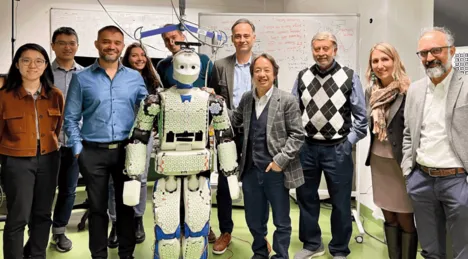
Nitish Thakor, TUM-IAS Hans Fischer Senior Fellow and Professor of Biomedical Engineering at Johns Hopkins University, had a joint workshop with Gordon Cheng, TUM-Professor of Cognitive Systems, in Munich on October 30, highlighting their years of collaboration.
Sensory integration, merging and coherently using sensory inputs, has become a frontier in robotics, rehabilitation, and sensory neuroprostheses. In prostheses and rehabilitation applications, different streams of sensory information are perceived and integrated by individuals with sensorimotor deficits to interact with the environment. In robotics, sensory information allows robots to achieve human-like behavior when interacting with objects.
This workshop aimed to discuss the latest advances and challenges in understanding sensory perception and integration in intact humans, evaluating sensory integration in individuals with sensorimotor deficits, and achieving sensory fusion for humanoid robots. From somatosensory feedback and cortical responses to robotics and algorithms that enable multimodal sensing in robots, participants learned about the latest advancements, methodologies, and scientific and technological challenges along these paths.
IAS meets Humboldt: Reception at TUM-IAS
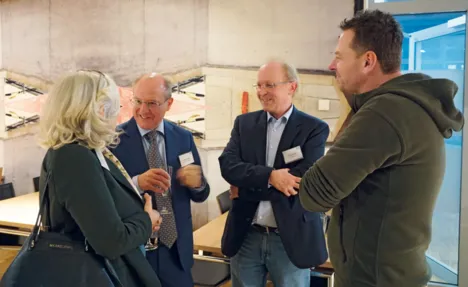
TUM is one of the most successful universities in Germany when it comes to hosting internationally renowned Awardees and Fellows of the Alexander von Humboldt Foundation for research stays. Fellows and Awardees of the Alexander von Humboldt Foundation are automatically Members of TUM-IAS if their Host is a TUM Professor. In addition, the TUM-IAS is the central point of contact for applications for fellowships and awards from the Alexander von Humboldt Foundation. TUM-Senior Vice President Professor Gerhard Kramer invited all Humboldt Fellows and Humboldt Awardees at TUM and IAS Fellows, as well as their TUM Hosts, to a reception at the TUM-IAS Faculty Club on November 18, 2024, to strengthen the connection to the Humboldt Foundation and to support networking among Humboldt Awardees and Fellows.
Two Humboldt awardees of the Humboldt Foundation’s Carl Friedrich von Siemens Research Award gave insight into their research:
Polina Bayvel from University College London and ICCS / Optical Networks Group, Department of Electronic & Electrical Engineering, is a highly accomplished professor specializing in optical communications and networks. She gave an interesting overview of her research with the title “Maximising the capacity of optical networks – how far have we come and what else can we do?”. She leads the Optical Networks Group at University College London (UCL), which she founded in 1994. Her groundbreaking research focuses on maximizing the capacity and speed of optical fiber communication systems, addressing fundamental challenges like nonlinearities in optical networks, and advancing multi-wavelength systems critical for modern digital communication infrastructure.
Andreas Winter from the Universita Autonoma de Barcelona, Quantum Information Group, who is also a TUM-IAS Hans Fischer Senior Fellow, is a renowned theoretical physicist and expert in the field of quantum information theory. His research focuses on the mathematical foundations of quantum information. In his talk, he offered a detailed illustration of the development of quantum information titled “Quantum information: from foundations to 6G”. He explores the intersection of quantum information theory and its potential applications in advanced communication technologies, such as 6G networks. He discusses how quantum principles can revolutionize secure data transmission, surpassing classical cryptographic systems by enabling physically verifiable privacy. This innovation is particularly significant given the potential of quantum computers to undermine current cryptographic methods. Discussions, poster presentations, and a buffet concluded the evening. Mira Albus from the Humboldt Foundation was a valuable guest for the participants, who clarified questions and discussed ideas.
Workshop “Agentive Matter(s)”
Advanced digital technologies and research in architectural materials and construction processes transform work and life toward digitization and sustainability. These developments present opportunities to reduce environmental impacts and address long-standing labor inequalities, social injustices, and gender imbalances in the field. This workshop aimed to explore how social discourses and knowledge cultures shape and are shaped by new technologies. It examined design processes at the intersection of craft, systems thinking, and algorithmic cultures, explored how the knowledge embedded in technology can be made more accessible, and offered ways to engage with the ecologies of making.
Agentive Matter(s) is a two-phase initiative that aims to identify new approaches to teaching and learning about how technologies transport societal discourses from the past into the future. Phase 1 was an expert workshop exploring techniques for tracing discourses and knowledge across the past and present. Phase 2 will take the lessons learned from the workshop and translate them into an educational format that asks what societal actions the history of technological artifacts is producing today and how we can shape them to increase sustainable outcomes.
TUM-IAS Anna Boyksen Fellow Nathalie Bredella organized this workshop in November 2024 in collaboration with TUM-IAS Rudolf Mößbauer Tenure Track Professor Pierluigi D’Acunto (TUM School of Engineering and Design), Kathrin Dörfler (TUM School of Engineering and Design) and TUM-IAS Rudolf Mößbauer Tenure Track Professor Anna Keune (TUM School of Social Sciences and Technology).
Women@ED – A networking event for women of the TUM School of Engineering and Design
A new series of networking events at the School of Engineering and Design for Women started in November 2024. Its idea is to build a vibrant community, to spark inspiring conversations, and to dive into professional development featuring dynamic workshops, guest speakers, and engaging networking sessions.
The first event started with Jihyun Lee, a Mechanical and Manufacturing Engineering Professor at the University of Calgary and TUM-IAS Anna Boyksen Fellow. There was space for guided networking between women of the School of Engineering and design at all levels (students, scientists, professors).
Exploring New Horizons with Molecules on Surfaces
The scientific purpose of Focus Group of TUM-IAS Hans Fischer Senior Fellow Lifeng Chi, Professor of Functional Nano and Soft Materials at Soochow University, China, and Johannes Barth, TUM Professor of Molecular Nanoscience, was the development and exploration of a new materials base towards controlled electronic properties (electronic transport, optical absorption, excited state imaging) of highly ordered molecular monolayers, as well as polymeric organic wires and sheet structures, specifically using surfaces of wide bandgap semiconductors and non-conducting interface layers. The fabrication protocols of these innovative heterostructures rely on directed molecular self-assembly and on-surface synthesis, as well as comprehensive investigations and improved methods of suitable substrates.
The Closing Symposium in December 2024 was also an exploratory workshop where the project efforts and insights were discussed and put into perspective.
Moreover, it was aimed to establish a link to the extremely promising and closely related domain of “Engineering and design of interfacial nanographenes and carbon-based architectures as innovative nanomaterials.” Synergies and ideas for further research initiatives evolved. To this end several recognized scientists in the field were invited, most of them providing comprehensive experiences in the field of on-surface synthesis and impressive records or seminal achievements regarding the engineering and design of interfacial nanographenes and carbon-based architectures. These include, for instance, innovative synthesis protocols and the realization of carbon nanomaterials with truly novel properties. Key examples are last-generation graphene-nanoribbons, biphenylene networks, graphyne- and graphite-type 2D materials, magnetism in surface-confined metal-organic sheets, and 2D materials. Many of these systems bear significant promise as do novo-designed quantum materials for quantum science and technology applications.